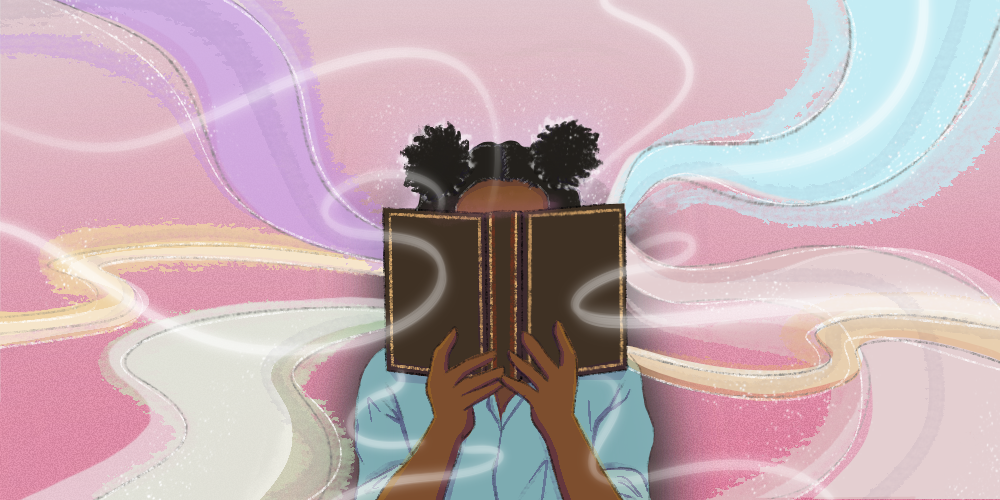Does reading leave a residue? Whenever I’ve accumulated a stash of glossy magazines, I like to make strips from the perfume samples embedded in their pages. These I will turn into bookmarks, which will turn me into a voracious consumer of words. That, at least, is the promise contained in voluptuous notes of sunny daffodil and jasmine, or velvety sandalwood and iris. Also, violet, which, as it turns out, is a kind of aphrodisiac: when you get a whiff, volatile molecules momentarily stun your nose and leave you craving more violets — and, in my case, words.
Reader, I have been indiscriminate in my sampling of all these notes and more. Collecting fragrances for its own sake has never appealed to me. I’ve never walked into a Sephora, for instance, and wanted to douse myself in dozens of scents or hoard perfume samples. The times in my life when I have consistently worn perfume, I have stuck to one scent made by Chloé — an orange blossom infusion —that seems to work with my body’s natural smell. Not having to think about what fragrance to pair with what outfit meant I could focus on other things that day.
I exercise even less discretion when choosing scents for books. Spontaneity is key. To impose any systematicity onto this sniffing would defeat the purpose and strip away its element of surprise. Each time a stack of magazines lands in my mailbox, I rip out all the perfume ads and place them in a small pile near a larger stack of books. Four periodicals a month yields around a dozen samples — more than enough for even my wildest readerly ambitions. I observe only one rule: Do not open any of the flaps until I am ready to insert them into a book.
Textual monists may recoil at this idea: why interpose anything between you and a book? Why not just dogear? Or, why not light a candle, or burn incense, or even brew a cup of hot tea? Each of these methods undoubtedly works to create a mood, but absent from them all is the act of inhaling a new smell coincident with splaying open a page. An impression is made as soon as I unfold the scented bookmark, and a race against its fading commences: will I be able to finish the book before the fragrance evanesces into thin air? I’ve found that the life span of a strip is usually no more than a week. The fading smell is always a goad to gallop along the pages. Sometimes, though, the length of a book outstrips the life of a pacesetter. This happened last summer as I embarked on a reading of Don Quixote for an online course. Even as I was ravenous to read about more of the titular character’s misadventures at castles (common inns), run-ins with prostitutes (highborn damsels), and giants (windmills), I developed a pastiche of my own: not of literary genres, but of scents. Week after week, I kept scything scents and returning to the same book, made ineluctably strange and therefore enticing by a new fragrance.

And the scents are often new to me: a strange alchemy that remains irreducibly mystifying for the duration of time it takes to finish a book. That, too, seems consonant with the experience of reading. The mind grasps at analogies to name a whirlwind of smells, and this habit of making comparisons, of finding the seam between unlike concepts, is a state of mind I want to be in when preparing to read any book, and most certainly a novel. Am I priming myself for a certain reading experience? I sure hope so. Books always assume some makeshift identity in our minds before we encounter them for ourselves. We form some hazy notion of X book, festooned in review ribbons, bow blurbs, and critical cravats. For the literate citizen, there can be no pure, unconditioned response to a work. Search for a book on Amazon (or, more likely, have one “recommended” to you by an inscrutable algorithm) and your eyes snag on eager endorsements. Walk into a bookstore and immediately descry, on a spot on a table that a publisher has secured at great cost, a bestseller.
The marketing apparatus that supports, indeed makes possible, any book is not per se the issue. Scent spirals can be a subtle reminder that the ephemera surrounding the book is just that: ephemera. As a reader, I like to be able to form my own judgments. What often comes packaged as prolegomena, I treat as scholia. I will set aside reviews to read as companion pieces after I’ve finished a novel.
If “taste” is the privileged metaphor for criticism, where does “smell” come in? Does it enable us to form more precise impressions as readers? Neuroscience can only tell us that these two capacities are closely allied: when you smell someone, you’re really just eating them with your emotional receptors. In dances of previous eras, a woman would cut an apple slice and put it under her armpit, to then give to a man she liked, who would eat it.
Though it seems a category error to speak of “destinations” for the journey of reading, I will often be able to recall the origin of specific travels in smells. And if reading is a form of travel — an ontological hitchhiking into a new realm — then I want as many senses as possible to be open to that experience. No matter if the scent I’m inhaling is at jarring odds with the book; even a dissonant note can help stimulate or solidify an immanent critique. Like Heidegger’s hammer that suddenly calls attention to itself the moment it stops working, a smell becoming suddenly discordant stops me in my readerly tracks. I reflect, I revise, I resume. Man: an animal rotten with perfection, as Kenneth Burke tells us.
With each new page, I unravel and reknit the fabric of my ideas about a book. The best novels never invite one totalizing view, but a plurality from each time it’s reread — perhaps as many views as there are notes in a woody, bergamot bouquet sampler. To then give a book away with its ghostly trace still lingering is a twofold intimacy. Call it an “erotics of reading,” call it scents delirium; call it what you will. Ideally, the voyage never ends. •




